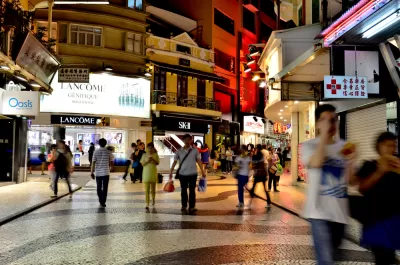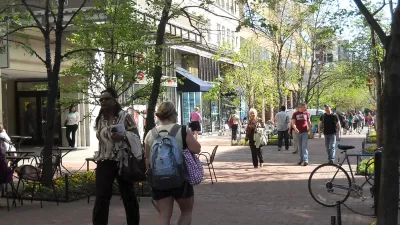Cities are putting together the pieces of walkability, but there's still work to be done in completing the puzzle.

Laura Laker writes a feature story on how cities are making their cities more walkable, and why:
The modern obsession with autonomous and electric vehicles, dockless scooters and bicycles means it is easy to forget the humble pedestrian. However, as almost every journey starts or finishes on foot, we are ignoring a fundamental part of what makes a city great.
To gather the evidence for the story, Laker surveys representatives from organizations like the UK walking charity Living Streets, the design and planning company Arup, and the National Association of City Transportation Officials (Nacto).
The article goes into detail on case studies from Auckland, London, Manchester, Hanoi, Denver, Addis Ababa, and San Francisco. One particularly compelling anecdote from these case studies:
Notoriously car-centric Auckland in New Zealand recently published a report showing pedestrians as the most economically important transport mode in the city. They estimated that policies which put people off walking on Queen Street, a major shopping area, cost NZ$11.7m (£5.9m) a year.
While there are many examples of cities working hard to improve safety for pedestrians, and from numerous approaches the many risks facing pedestrians, Laker makes one thing abundantly clear: there's still along way to go and cities will require a lot of strong leadership to make dreams of a truly walkable city come true.
FULL STORY: What would a truly walkable city look like?

Maui's Vacation Rental Debate Turns Ugly
Verbal attacks, misinformation campaigns and fistfights plague a high-stakes debate to convert thousands of vacation rentals into long-term housing.

Planetizen Federal Action Tracker
A weekly monitor of how Trump’s orders and actions are impacting planners and planning in America.

In Urban Planning, AI Prompting Could be the New Design Thinking
Creativity has long been key to great urban design. What if we see AI as our new creative partner?

Florida Seniors Face Rising Homelessness Risk
High housing costs are pushing more seniors, many of them on a fixed income, into homelessness.

Massachusetts Budget Helps Close MBTA Budget Gap
The budget signed by Gov. Maura Healey includes $470 million in MBTA funding for the next fiscal year.

Milwaukee Launches Vision Zero Plan
Seven years after the city signed its Complete Streets Policy, the city is doubling down on its efforts to eliminate traffic deaths.
Urban Design for Planners 1: Software Tools
This six-course series explores essential urban design concepts using open source software and equips planners with the tools they need to participate fully in the urban design process.
Planning for Universal Design
Learn the tools for implementing Universal Design in planning regulations.
Gallatin County Department of Planning & Community Development
Heyer Gruel & Associates PA
JM Goldson LLC
City of Camden Redevelopment Agency
City of Astoria
Transportation Research & Education Center (TREC) at Portland State University
Jefferson Parish Government
Camden Redevelopment Agency
City of Claremont





























